Gender Equality National Report Hungary - European-microfinance ...
Gender Equality National Report Hungary - European-microfinance ...
Gender Equality National Report Hungary - European-microfinance ...
You also want an ePaper? Increase the reach of your titles
YUMPU automatically turns print PDFs into web optimized ePapers that Google loves.
A recent study about men and women’s enterprises in the country reaches similar<br />
conclusions. 32 Companies owned by men and those owned by women are fairly similar, real<br />
differences can be found in the startup of the companies. A sign of that could be seen in the<br />
lower share of opportunity-driven enterprises among women than among men; while the<br />
share of start-ups driven by mixed motives is higher among women. The idea of necessity is<br />
probably assessed in a different way by women, as for them the possibility of having a child<br />
and getting maternity benefit or becoming a housewife is a socially accepted choice; while<br />
for men becoming unemployed is the final option. Still there is a “grey zone” of women’s<br />
lower share in new business start-ups; an unclear reason why when faced by the same<br />
circumstances men choose to become entrepreneurs while women to become employees. A<br />
possible answer lies in the difference in willingness to take risks. Although the majority<br />
(about two-third) of new enterprises is set up to seize a good business opportunity or to<br />
improve one’s financial status; 8% more women become entrepreneurs out of necessity<br />
than men<br />
An enterprise’s success (or failure), limits of development, growth, viability and stability are<br />
greatly determined by the circumstances of the start-up. The lack of resources for the launch<br />
of a business shows a devastating picture. More than 25% of female entrepreneurs asked<br />
did not have the necessary capital for the start-up and the amount of capital was in general<br />
very low – similar to the already existing businesses in <strong>Hungary</strong>. (For 50% of the female<br />
entrepreneurs asked the available founding capital was less than 300,000 Ft (EUR 1,200);<br />
and only 15% of them had more than 500,000 Ft (EUR 2,000).) These figures indicate that<br />
most of the female enterprises start practically without or with a very low amount of capital;<br />
these entrepreneurs can be considered self employed according to international definitions.<br />
c.) <strong>Gender</strong> equality in established business owners Score 3<br />
There are twice as many enterprises owned by men than by women in <strong>Hungary</strong>, according to<br />
statistics and studies. The historical background to this has previously been discussed, the<br />
motivations will be analysed below.<br />
Significant difference can be seen between women and men among the owners of small<br />
enterprises (10-49 employees); satisfaction with the performance of the company as well as<br />
the future development perspectives is considered considerably worse by women than by<br />
men.<br />
Obstacles preventing growth are considered very similarly by the genders; taxes and social<br />
security fees, burdens of overcomplicated administration and insufficient domestic demand<br />
are most often mentioned as the main factors hindering expansion by both women and men.<br />
Women feel the limits of development to be less restricting; but this can possibly be<br />
explained by the fact that the share of enterprises willing to expand is lower among them<br />
than among men.<br />
3.5.2 <strong>Gender</strong> equality in entrepreneurial characteristics<br />
Score 2.5<br />
The economic and political changes that occurred in <strong>Hungary</strong> in the previous decade show<br />
themselves in the dimension of social connections in the form of a unique tendency: social<br />
32 Szerb L. 2007 Nıi vállalkozók és nıi tulajdonú vállalkozások jellemezıi Baranya megyében 2001-2004, Kézirat Pécsi Tudományegyetem<br />
Közgazdaságtudományi Kar<br />
50



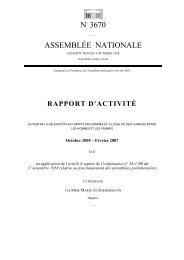
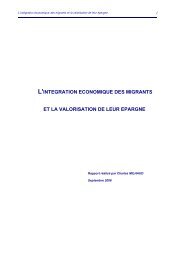

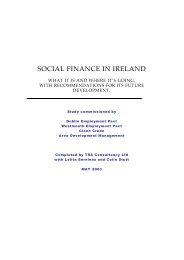

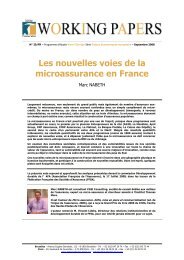
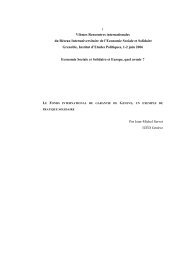
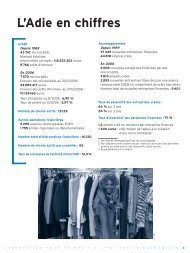
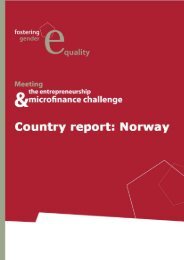

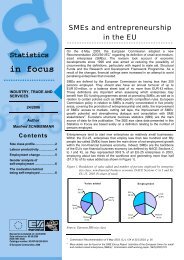
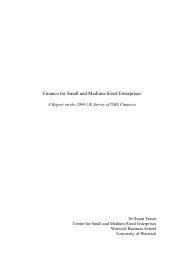
![Joint Report on Social Protection and Social Inclusion [2005]](https://img.yumpu.com/19580638/1/190x132/joint-report-on-social-protection-and-social-inclusion-2005.jpg?quality=85)
